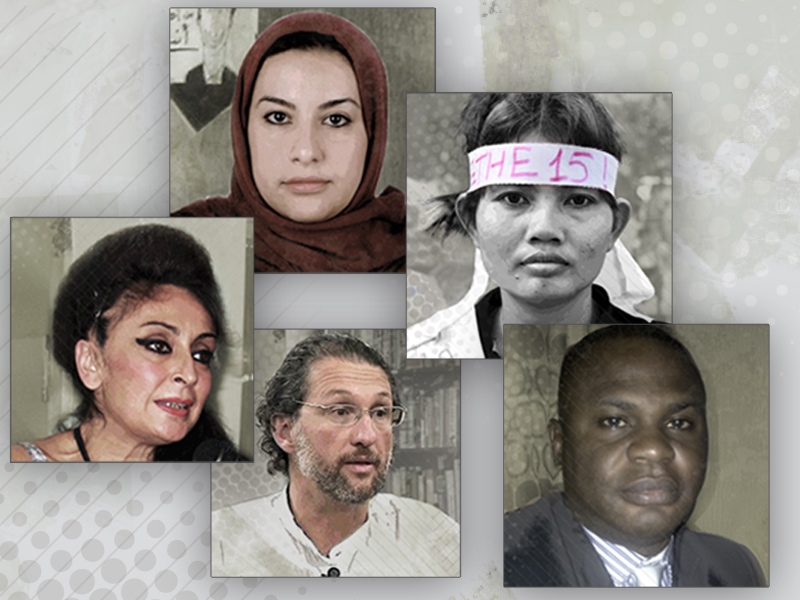How do you break a culture of impunity? Support a culture that challenges impunity.
How do you break a culture of impunity? Support a culture that challenges impunity.
Three years ago, members of the IFEX network met in Beirut to discuss attacks on free expression and how to defend those who are targeted for speaking truth to power.
They agreed that a culture of impunity was feeding a climate in their countries where others were empowered to commit similar crimes, knowing they would likely walk away. The resulting chill on society as a whole was a shared concern – others would silence their own voices for fear of putting their careers, safety, and families at risk.
Imagine how serious and widespread a problem has to be for a diverse network of over 80 organisations based in more than 60 countries to agree on it. Nevertheless, voices were united on this crucial point – that no matter whether the attacks on free expression were against artists, protesters, lawyers, activists or the media, whether expressed in the form of censorship, legislation, imprisonment, intimidation, assaults, or even, in the ultimate form of censorship, murder – these attacks all had something in common. People were getting away with it. No matter if the perpetrators were governments or individuals, they were not being held to account for their crimes. Hard to believe? In a shocking 9 out of 10 cases, people were murdering journalists with impunity.
So the idea of an international day dedicated to challenging the culture of impunity itself took shape. Now, three years later, it is a truly global movement. The third annual International Day to End Impunity campaign launched on 1 November 2013, and culminates on 23 November.
Every year, a growing number of IFEX members and concerned individuals have taken part in this campaign that strikes at the very roots of the problem. Through the 23 Actions in 23 Days hosted on daytoendimpunity.org, as well as through events inspired and informed by the local context, we are turning up the volume on the call to end impunity.
The impact of the campaign is growing as well. IFEX members are participating in television debates, conferences, silent marches, social media campaigns. They are releasing reports, creating videos, infographics and multimedia sites to spread the message far and wide – the culture of impunity must end. The remarkable creativity and reach of this global network is building momentum for this important cause.
Join us. Visit daytoendimpunity.org on 23 November. Take action on behalf of the five cases the campaign is profiling this year. Check out the map of global campaign events. And next week, visit ifex.org to view a photo gallery of the top photographs submitted to the campaign’s photo contest – Impunity Exposed.
No single day, no single campaign will alter the reality that free expression is under threat in every country in the world, as well as on the Internet – a relatively new country we are all spending increasingly more time in. It is still the case that the people threatening free expression are getting away with it. In some cases, they are literally getting away with murder.
This calls for a year-round movement, one that includes all who care about freedom, and about justice. Consider this an invitation. Be vigilant. Stay informed. The IFEX website has a section dedicated to reports and alerts involving impunity, as well as a section where you can take action on specific cases. Help us call attention to crimes against free expression and press freedom whenever and wherever they arise. We can turn a culture of impunity into a culture that has no tolerance for it.
—–
Impunity by the numbers:
• In the past 20 years, more than 670 journalists have been murdered. In 9 out of 10 cases, these have been committed with complete impunity.
• Of the 143 investigations on crimes against freedom of expression since 2006 in Mexico, only 1 has resulted in a conviction.
• Between 2010 and 2012, 38 human rights defenders were assassinated in Guatemala, Honduras and Mexico. The perpetrators went free in 98% of the cases.
• Of 54 journalists murdered in Russia since 2000, in only one case have the perpetrators been brought to justice.
• In Brazil, 9 human rights defenders and 7 journalists were murdered in 2012 for speaking out. And this year, more than 200 protesters were arrested during the mass demonstrations and protests in June. To date, there has been no investigation into the police violence surrounding these events.
• Since the beginning of 2013, there have been at least 54 incidents of attacks and threats against journalists in Ukraine. Only 4 of these cases have been brought to court.
• Of the 45 murders of journalist in Pakistan since 2003, none have been solved.
• Since pro-democracy protests began in February 2011 at least 14 children have been killed with impunity in Bahrain as a result of excessive use of force by security forces during demonstrations.
• 2012 was the deadliest year for the press in Somalia with 12 journalists killed. No one has been charged.
• From January to June 2013, there have been at least 26 reports of violent attacks against journalists in Azerbaijan. None of the masterminds have been brought to justice.
